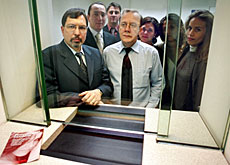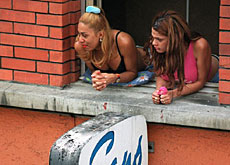Women’s groups highlight cabaret club abuses

Cabaret dancers in Switzerland will still face violence and sexual exploitation, despite attempts to improve their lot, according to women’s groups.
A new contract designed to guarantee improved working conditions came into effect on January 1.
The contract applies to all cabaret clubs in the country and stipulates that the dancers – who mainly come from eastern Europe, as well as South America and Asia – are guaranteed shorter working hours, better pay and improved protection against sexual exploitation.
About 1,200 women come to the country a year, usually on short-term permits, to work in Switzerland’s 400 cabaret clubs.
But at press conference in Zurich on Tuesday, ProKoRe, an umbrella group for organisations lobbying for improved rights for sex workers, said that abuses including dishonesty over pay, violence and sexual exploitation were still rife.
Heavy drinking
Marianne Schertenleib from FIZ, one of the groups that make up ProKoRe, says that one of their strongest objections is that women are often forced into encouraging men to buy expensive alcohol to boost the club’s profits.
This often leads to excess drinking and sometimes to prostitution.
“In reality the contract is not respected in that employers find a way to reduce the salary of the dancer, or force her to do work that she is actually not obliged to do like [excessive] champagne consumption or prostitution,” Schertenleib told swissinfo.
The new contract was drawn up by the employers’ association and Asco, the Swiss Association of concert halls, cabarets, dancehalls and discotheques, in consultation with women’s groups.
Denial
Angelo Pfister, a member of Asco and owner of the Calypso nightclub in Zurich, admits that the contract offered to women is not perfect but denies any of the dancers are being exploited.
“I know there are some problems, there is always somebody who doesn’t adhere to the contract but in other industries as well, you never find that everybody is happy with the contract,” said Pfister.
“It’s very important for the women that they have a contract. When you have a contract then you are free to do what you want, you can work everywhere in Switzerland and that’s important for the girls – the contract is very good for the dancers,” added Pfister.
Abuses
But Schertenleib says ProKoRe has heard of and seen many examples of abuse of the system.
The organisation said that, based on 2002 statistics, it had uncovered 100 instances of the wrong salary or no salary being paid, 68 instances of unreasonable fines, such as money being deducted for having food in a room or a blocked sink, and 48 cases of forced prostitution. There were also 30 cases of mental or physical abuse.
She says that the employers should wake up to the fact that there is a more murky side to their profession.
“We do not agree with their point of view, they deny the situation, and they do not accept or consider that actually it has to do with the sex industry and they are part of the sex industry,” said Schertenleib.
More respect
Schertenleib and her colleagues are calling for employers to have more respect for the contract and for the dancers themselves.
ProKoRe also wants women on short-term permits to be allowed to change profession, which is currently prohibited.
They want a ban on dancers being forced to drink alcohol and want the authorities to clamp down on those who ignore the new regulations – because they say the new contract alone is not enough to stop cabaret club exploitation.
swissinfo, Isobel Leybold in Zurich
More than 1,200 cabaret dancers are registered with an L permit in Switzerland. Others have a B permit.
Created in 1975, the L permit allows an 8-month stay. The dancers have to change employer every month.
About 6,000 dancers come to and leave Switzerland every year.
Only the cantons of Thurgau, St Gallen and Zug don’t have L permits. Aargau cancelled the use of the permit but reintroduced it after noticing a rise in illegal workers.

In compliance with the JTI standards
More: SWI swissinfo.ch certified by the Journalism Trust Initiative












You can find an overview of ongoing debates with our journalists here . Please join us!
If you want to start a conversation about a topic raised in this article or want to report factual errors, email us at english@swissinfo.ch.